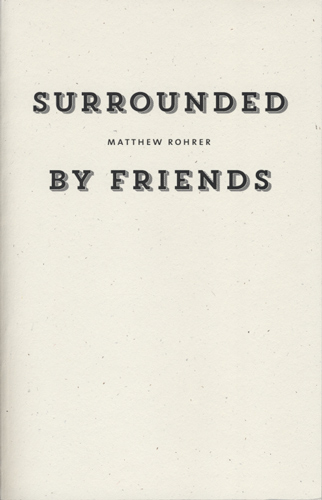Surrounded by Friends
Every evening in the city
is a deep pool of wineEveryone who lives in the city
is drunk with itAnd cannot leave
They are surrounded by friends
Every evening in the city
is a deep pool of wineEveryone who lives in the city
is drunk with itAnd cannot leave
They are surrounded by friends
These lines, from which Matthew Rohrer’s new collection takes its title, arrive near the end of the collection in one of Rohrer’s “Translations from Hafiz,” and come as close as any to summarizing the tenor of its poems. In Surrounded by Friends, city life itself acts as a sort of communal inebriant, providing residents with an endless cocktail of experience to partake of, challenging them to remain sober enough to stay meaningfully engaged among competing concerns and seductive distractions. In Rohrer’s poems, seemingly no facet of contemporary experience is given primacy or rejected as being unpoetic. In short, sparingly punctuated lines, the practical concerns and everyday demands, which make up the bulk any life, both hinder and spur on the speaker’s capacity for insight. Rohrer records what matters and what gets in the way of what matters, and in doing so captures the humor and pain that comes from our humble attempts to grapple with the big questions. Whether writing about a photograph exhibit or the Mars rover, a child’s field trip or a father’s hangover, Rohrer creates poems that are funny, tender, and human.
Rohrer’s ability to capture a speaker’s mindset by layering insight and action is on full display in “The Photographs of Allen Ginsberg at the Grey Gallery, NYC.” The poem opens with a simile that deftly catches the melancholy of looking at Ginsberg’s snapshots of Beat Generation luminaries and friends whose heydays are now bygones:
Photographs of young people
growing old are like lights on
in a tall building
and the sun still in the sky.
Rather than remaining a more traditional ekphrastic poem about the speaker’s contemplation of the photographs, the real world intrudes on the moment. Shortly after this opening simile, while the reader’s still grappling with its implications, Rohrer’s speaker decides to take:
—a break to text
are you high?
—good—the Ginsberg
photos are great—
The speaker’s youthful need to get in touch with a friend to discuss his excitement about art and drugs not only dovetails nicely with the subject matter of the photographs, it also seems to signal that the photographs have made the speaker uneasy, triggering a recognition of his own transience. When practical asides such as this text break occur in Rohrer’s poems, they usually do so because the speaker is avoiding or combating a building sense of loneliness.
Rohrer’s use of such contemporary expressions of longing for connection work amazingly well in the third of the book’s four sections, which consists of a series of fourteen poems written “in collaboration” with long-dead Japanese poets Buson, Bashō, and Issa. Borrowing lines and inspiration from Robert Hass’s book of translations, The Essential Haiku, Rohrer creates witty and moving originals in which the philosophical and natural themes of the Japanese originals are brought into the sphere of modern domestic life. In the series’ first “Poem Written with Bashō,” Rohrer provides a funny and heartfelt account of what waking up as a father with a hangover is like:
I drink from a downpour
and choose her socks
with tiny whales.
I wrote her a song
about our pressing need
to grocery-shop
until it was clear, the mirror
showed a few more years
and a disappointing doughnut.
Let that be my name.
Most of the poems in this series are more serious, but this one illustrates a charming weirdness of the collaboration, contrasting the father’s fleeting hangover and the playful moments with his daughter with the more permanent and less flattering ravages of time that he sees in the mirror.
As I’ve thought about the collection’s concern with how the routine and the metaphysical intersect, the Mars rover, as it’s described in Rohrer’s short poem “There is Absolutely Nothing Lonelier,” began to seem like the collection’s totem animal/robot. In the poem, the speaker, walking down a New York street, projects his own concerns about the limits of human connection onto the Mars rover which ceaselessly carries out its banal tasks, separated from its own kind by mind-bogglingly distance:
There is absolutely nothing lonelier
than the little Mars rover
never shutting down
[. . .]
I wonder if he makes little beeps? If so
he is lonelier still. He fires a laser
into the dust. He coughs. A shiny
thing in the sand turns out to be his.
The poem reduces one of life’s central questions to its essence: What should I be doing while I slowly fall apart? On one level, the poem’s fatalism is funny, but on another level, it reminds us in disturbingly concrete terms of our own colossal insignificance.
Both the slight and serious moments Rohrer captures in Surrounded by Friends play out against this backdrop of deeper questioning, which not only unifies a collection that’s extremely varied in its subject matter, but also makes reading and rereading the collection a pleasure.





